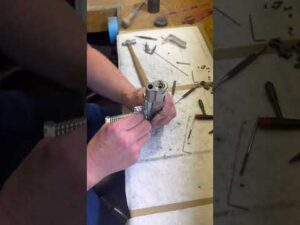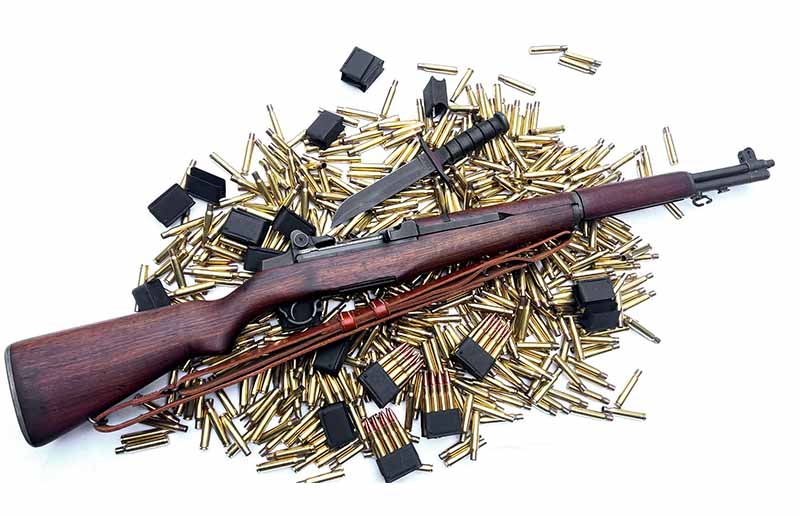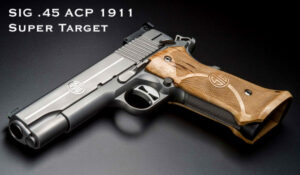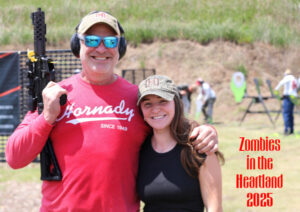Guns are no exception. Fashion comes and goes. It could be that the 10mm is making a comeback this year, or the 1911 has a new design hitting the market making it “relevant”. But the M1 Garand was not a victim of fashion. It’s a rifle that is always in style, no matter when or where it appears. However, things have changed in the M1 world … and not necessarily for the better.Dried-Up Surplus StockpilesUnfortunately for us, we’re in something of the twilight years of the surplus market. In my teens, I could buy many surplus guns for under $500, and sometimes even as low as $50. It was a lot of cash for a teenager working in fast food but there was so much of it that it seemed to never end. Today, the vast majority is dead. Various Mauser rifles from the post-World War II era that once sold for $150 now sell for upwards of $800, which is way beyond the reach of hobbyists and collectors. Guns that were once plentiful are now so highly sought after that a good example of a Mosin Nagant can cost upwards of $1500 or more. Finnish examples are now commanding such a high premium that they are almost impossible for the average collector to justify. The M1 has been limping along through all of this chaos but is also slowly disappearing. They’re still at around $1,000 today, the same price they’ve been at for 15 years. The rear sights on the M1 have a very intuitive design and are easy to use. You’ll want to make sure they work before you buy. The M1 is unique in its design. The gun is made in America and supported by an American aftermarket. There are probably more than all the others combined, but it’s impossible to say for sure. In the near future, prices for rebuilt M1 rifles at base level will increase. Get your M1 now: the deals are good. It could be argued the M1 is the most popular vintage firearm available today. This is mainly because it has a lot of cultural significance and is still relevant in terms of hunting and defense. These guns are used to train young men and women as armorers, which is not true for most other surplus weapons. Many companies manufacture their own stocks, barrels, and other parts to create a “new” M1. The M1 is a popular design in the United States, but that doesn’t guarantee that it will be around forever. The rifle in this article was purchased from a local firearms store on consignment. The previous owner had retired from competitive shooting and no longer wanted to own those guns. He mentioned in passing that his family didn’t go shooting and it was best to get rid of the guns. This rifle is an example of the type of rifles you will see at gun shows and those you can purchase from other shooters at CMP events. Attend one of these matches to get a direct link to surplus rifles. You can also pass your contact information on to the competitors. This will put you in touch with people who share your interests. You won’t be surprised if one of your CMP friends calls you to tell you that a gun is available in a local store. The Garand action opened: Although the internals appear complicated, they are not difficult to understand. The internals of the rifle are made up of moving parts, but they can be easily replaced if worn out. It’s normal for the M1 to move. These rifles are old and unique at this point. You’ll need a keen eye to see what you are looking at, as most of them have seen varying degrees of wear over the years. Few people in the world have a complete, matching M1 rifle. You’re being scammed if someone advertises a fully matched M1 rifle for less than $2,000. You’re mainly looking for the receiver, as the rest of the rifle can be easily stripped down and rebuilt. A desirable receiver makes up 90 percent of a finished firearm’s price. WWII receivers are more valuable than those from the post-war era, though pre-war rifles remain the most valuable. Collectors have made it a game to swap parts by manufacturer and month of manufacture. There’s no way to tell if the barrel was made at the same hour or if it was just at the beginning or end of the month. This is about the finest detail you can get. A rifle with a date-matched stock can be worth $500 to $1,000. If you want to compete, most stocks will need to be replaced. It is best to use new, clean wood. Beware of M1s that look too good at a gunshow. Birchwood Casey finish is cheap, and so is sandpaper. Also, check the condition of the actual action. One of my friends who has been an armorer for many years said that the average M1 would go through two stocks during its lifetime. The wooden parts of the gun are thin and easily cracked, so very few are original. It is easy to replace the stock of an M1 and can be done without many tools. Cartouches or stamps on stocks are not a reliable way to date a rifle. They are not only easily mismatched but also easily fabricated. Many companies now produce modern parts. Boyds, for example, makes a replacement stock that you can sand to your liking and finish. Laminate stocks are also an option. Barrels can be purchased from companies such as Criterion and custom manufacturers who cater to match shooters. Specialty gun makers, such as Fulton Armory can build a match-quality M1 from your receiver. They offer multiple packages, including options for turning it into a more modern rifle and tuning it specifically for the CMP. The M1 is not a large gun. It’s bulkier than the Mauser or 1903, but it’s still quite slim in many places. The CMP also sells the M1. As you can see, it is only a little wider than the ammo clips. If you’re interested in a roadtrip, you can drive to Camp Perry and take an M1. CMP has been selling these rifles for a long time, but they are a bit worn out today. In the past 10 years, you could find some pristine examples. Most of them are in a slightly worse-for-wear condition, but they can still be purchased for less than $1,000. Most of these guns will be used for match shooting but not necessarily for collecting. As the rifle is issued with iron sights it should be able produce 10 shot groups measuring 3 inches. If you are shooting from the bench, reduce this number by half. Yes, they’re that accurate. I have a Swedish Mauser 1896 that prints 1.5 inches from 100 yards, dating back to 1900. Another one from 1914 prints 2 inches using the same loads. I have owned and fired many M1903, M1917, and M1 Garand rifles that are 3 MOA or better. Front sights are mounted on the gas block assembly. The sights can be easily removed using a simple wrench. They can also be replaced with other versions. You can see that a National Match (NM), marked front sight has been used in place of the GI version. If you intend to shoot them, you should invest in erosion gauges. These gauges are used to measure the physical wear on the throat and muzzle. They can be inserted at a gunshow in a matter of seconds. You want a gun with a “0” which means no wear. You may hear someone say “it’s 1 at the muzzle, and 2 in the neck.” This means the throat is worn, but the muzzle still fits. If the barrel wears beyond a “3” on either end, you may want to offer less money because you will need to replace the barrel. Consider any gun that requires a replacement as a minimum of $200: Take this into consideration when you are looking to buy. You’ll also want check the mechanical properties on the rear sight. This can be done by resting your finger on the peep-sight and applying a little pressure. The windage and elevation drums must move smoothly under pressure. The moving metal rod is the gas piston. It extends from charging handle to muzzle. If you’re shooting CMP or any other service rifle, you’ll have to check the rules regarding bedding the stock. Bedding can improve accuracy on an M1. As-issued matches will not allow it but open divisions usually do. You can get around these rules in as-issued match by purchasing an oversized stock. You will need to finish the inlet, exterior and interior yourself, but it can be fitted to your gun to achieve similar results as glass bedding. Ammo and Loads for The GarandAs this writing, there are several companies that make M1 Garand specific loads. Keep the pressure down while shooting these guns. The modern.30-06 ammo is too powerful. You can adjust the gas block to accommodate modern ammo but it’s not necessary to wear out an old warhorse. Hornady produces an excellent M1 match loading (product number 81171) that features the 168 grain ELD match bullet. This is a great target load that has produced some of Camp Perry’s best scores. It is the best M1 ammunition available for scoring. The M1 loads are 8-round en bloc clips that eject with the last fired shot. They make that famous ping sound! Federal makes a great 150-grain FMJ for the M1 under its American Eagle brand. I’ve shot this ammo a lot in the past, but haven’t been able find it in a while. Federal’s site lists it as “unavailable”, but I hope to find some in the near future if ammo prices ever drop enough to allow companies to produce anything other than the 9mm and 5.56 NATO. Sellier & Bellot makes a great M2 round that is safe for the M1 rifle. It’s not as popular but it is readily available and in stock. It has also proven to be accurate in certain rifles. I’ve noticed that it’s a little pickier, and has more thump, compared to the Federal or Hornady, which are both mild in the M1. Also, Winchester announced a brand new M2 ballload at SHOT Show 2023. I’m happy to see that companies are making efforts to support the M1, despite the volatile industry. Editor’s Note: This original article appeared in the March issue of Gun Digest the Magazine.More on the M1 Garand:NEXT: Download Your Free Storm Tactical Printing Target Pack62 Printable MOA targets with DOT drills – Rifle range in YARDSThis impressive pack from our friends at Storm Tactical includes62 printable targets for rifle and handgun ranges. The target grids and bullseyes are in MOA. Subscribe to the Gun Digest newsletter and we will send you your print-at home target pack immediately. Enter your email below.

















